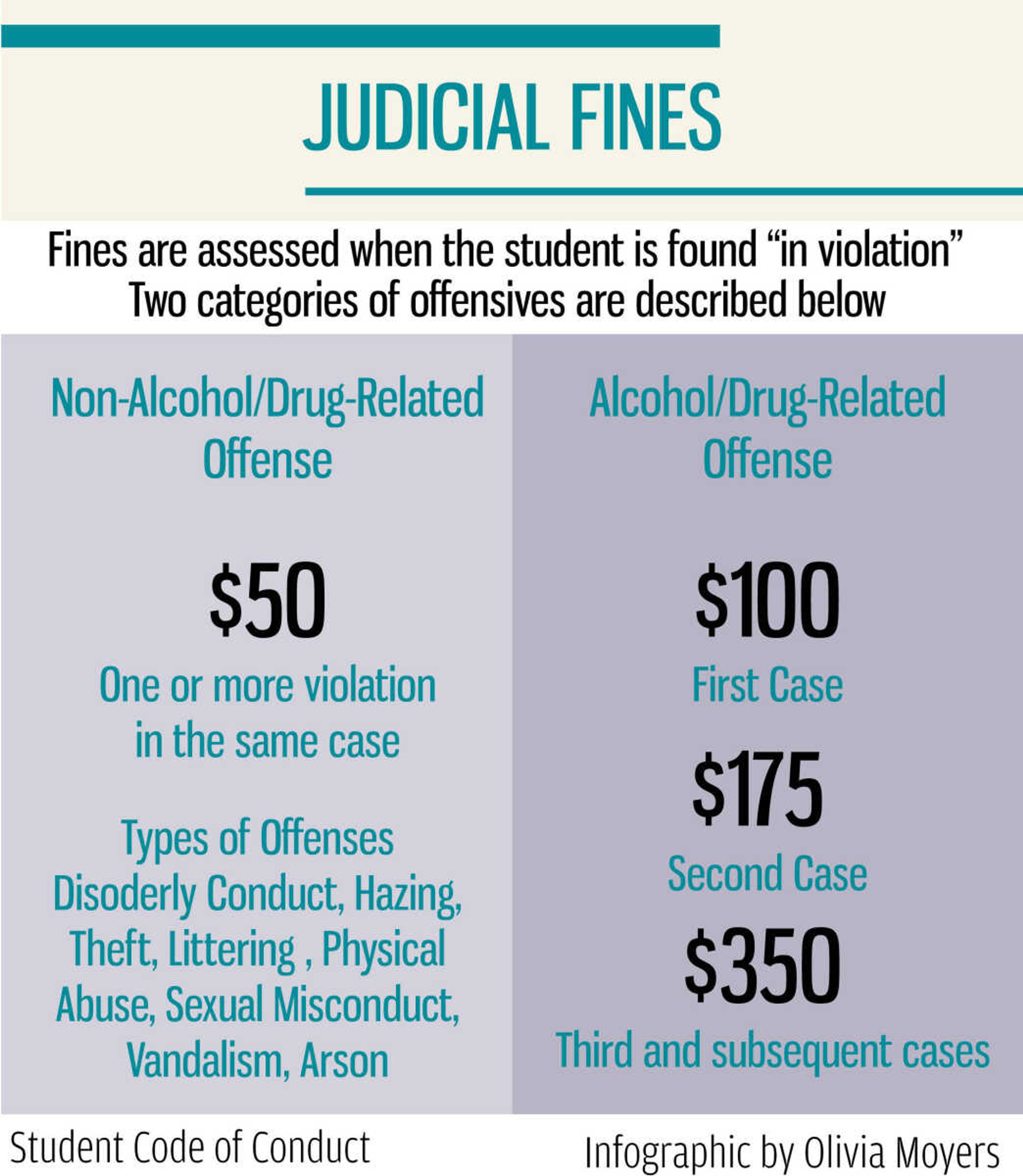Expulsion and suspension are the “automatic” and “likely” sanctions according to Southeast Missouri State University’s sexual assault guidelines. For students found guilty in the past five years for sexual assault, however, those sanctions were rare.
In the university guidelines for defining and adjudicating sexual assault cases involving students, it states: “Sexual misconduct is a crime punishable by both civil and criminal legal actions and a serious violation of the Code of Student Conduct. It will not be tolerated within our university community.”
Based on an administration response to a Freedom of Information Act request by the Arrow, received on Dec. 8, there were no recorded expulsions for any of the 16 sexual assault cases in the last five years where the accused was found guilty.
“There have been several expulsions from campus in the past five years,” Dr. L. Randy Carter, assistant dean of students, said. But the Arrow investigation reveals those were all for other offenses.
University student conduct officials sanctioned their first expulsion for sexual assault in five years in late December, after the Arrow received the FOIA response.
According to the adjudication process by the Office of Student Conduct, an accused student is found to be guilty or not guilty by a three-person administrative panel made up of two staff or faculty members and a student from the All University Judicial Board. If the accused is found to be guilty, a sanction will be issued.
“There is severity in everything,” Dr. Deborah Below, dean of students and vice president of student enrollment and success, said. “The punishment has to fit the crime.”

Below is in charge of appeals following the adjudication process, which is primarily conducted by Carter. She said that for sexual assault cases specifically, it is normal to have an appeal.
“I have seen a range of sanctions,” Below said. “What concerns me is that each one of these involve detailed information that is part of a process. Only those involved in the process have knowledge and information about it.”
The data shown by the Arrow’s FOIA request reveals that the result of “suspension” and “expulsion” are much less likely to occur than a “suspension held in abeyance.”

“Suspension held in abeyance” is not included in the list of sanctions for the sexual assault guidelines made by the university. It is, however, found in the overall Code of Conduct.
According to Southeast’s Code of Conduct, suspension from the university held in abeyance is considered a university behavioral contract. Essentially, it means that a student has been suspended, but the suspension has been put aside temporarily as long as the student follows specific guidelines within a contract. The student is considered not to be in good standing and is immediately suspended if he or she violates their contract or the Code of Student Conduct.
Frank LoMonte, director of the Student Press Law Center based in Washington, D.C., reviewed Southeast’s sexual assault guidelines at the Arrow’s request. He said the guidelines suggest a range of sanctions are possible unless a person is found guilty of a forcible sexual assault.
“If you are seeing students found responsible for forcible sexual assault who don’t get expelled, then the university is not honoring its own policies, and it’s a very legitimate question why not,” LoMonte said.
Eleven of the 16 students found guilty by the Office of Student Conduct in the past five years of sexually assaulting someone received the “suspension held in abeyance” sanction.
Three were suspended, which means the students were separated from the university for a specific period of time or until certain conditions were met.
Two were placed on probation, which places the student in bad standing with the university and includes a written reprimand. If they violate the Code of Student Conduct at any time during probation, they are likely to receive a harsher sanction.
And, due to a recent sanction — which took place after the Arrow’s information request — only one was expelled from the university. Being expelled means the student is separated from the university without a possibility of readmission.
Carter said an act must be egregious and have no gray areas of evidence in order to warrant expulsion of the accused.
He spoke of an example he uses when he speaks about sexual assault in UI 100 courses.
The example he uses actually occurred on Southeast’s campus. A sober man was carrying a woman passed out from alcohol intoxication in his arms. He took her up to her dorm room, locked the door and raped her as her suitemates tried and failed to enter the room. Carter said there were no gray areas in the case, and it was fairly easy to find the student guilty of sexual assault.
Carter said that student was suspended.
Among campus
Southeast junior Grace Whiteside filed a sexual assault complaint in which the accused was found guilty in early 2016.
Whiteside said her assailant was able to walk around campus for a semester under a suspension held in abeyance before he was expelled for a separate offense.
In her impact statement which was read at the end of her student conduct case, she said “she looks over her shoulder for him wherever she goes.”
Along with their main sanction, students found guilty of sexual assault also may receive punishments ranging from a $50 fine to community service to a mark on their school record or, if the student is not removed from campus, a mandated counseling program.
Unlike in a criminal investigation, if a student is found guilty through the Office of Student Conduct for sexual assault, they do not have to register as sex offenders.
Southeast freshman Kate Riney said she unknowingly befriended a male student who was found guilty of sexual assault by the Office of Student Conduct.
Riney said the student was moved from Towers Complex to Merick Hall in order to separate him from the girl he sexually assaulted.
“I considered this guy a friend of mine, but he is a rapist,” Riney continued. “I had him alone in my room not knowing that he is a rapist.”
For more information on the sanctions and adjudication process at Southeast, reference the Guidelines for Defining and Adjudicating Sexual Assault Cases Involving Students at http://www.semo.edu/pdf/stuconduct-sexual-assult.pdf.





